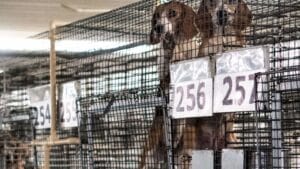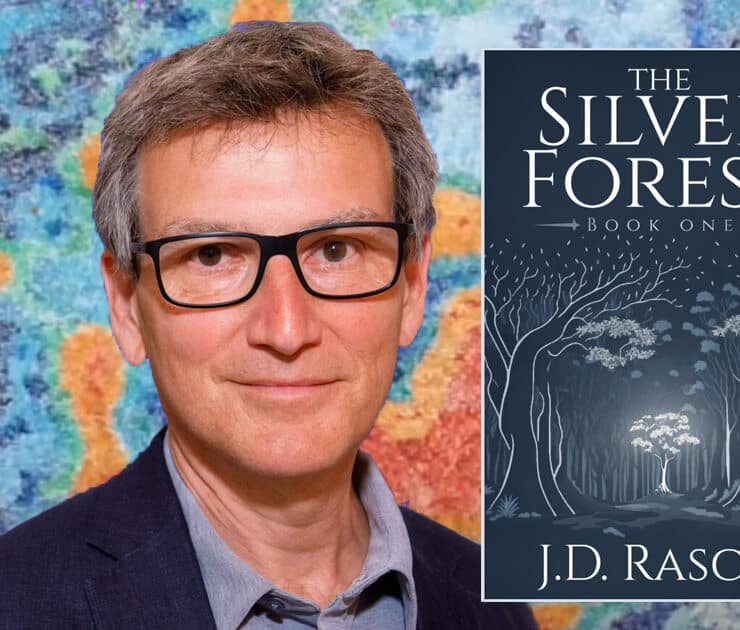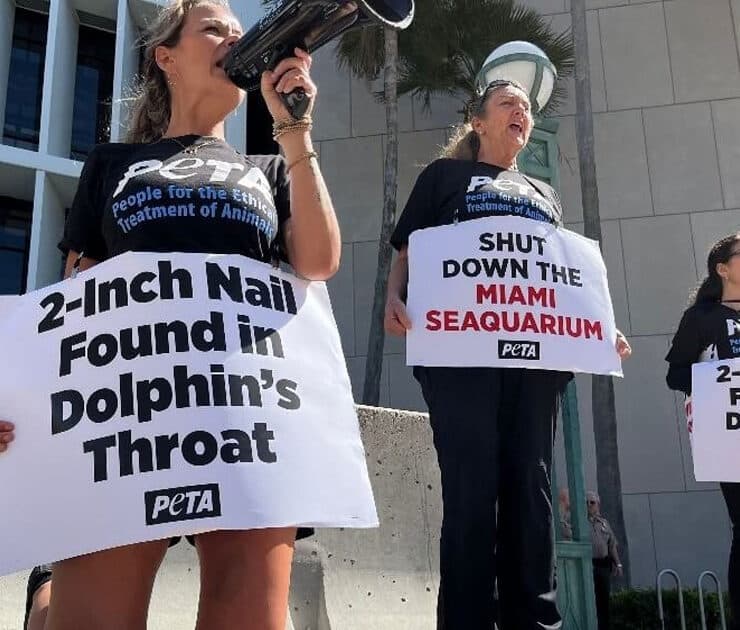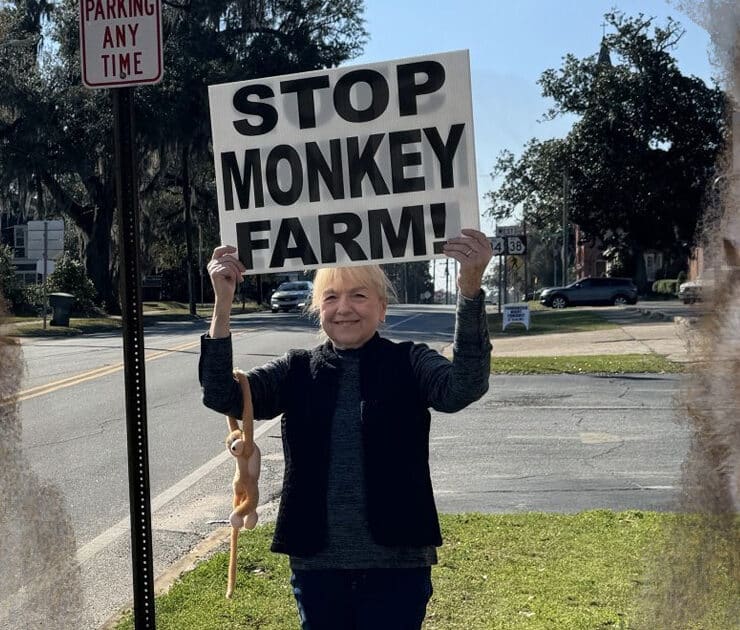All Charges Dropped in Beagle Open Rescue Case

All charges against all three defendants in the open rescue of three beagles from a laboratory dog breeding facility in Wisconsin were dropped days before the trial was set to begin.

Los Angeles, March 14th, 2024 — It was a stunning eleventh hour reversal in a criminal case that stems all the way back to 2017. That’s when animal rights attorney Wayne Hsiung, and two other activists from the organization Direct Action Everywhere (DxE), walked in with cameras rolling and rescued three distressed beagles from a massive Wisconsin facility that breeds beagles to be used in painful and deadly laboratory experiments. On March 8th, 2024, more than half a decade after the alleged crime and just a few days before their trial was scheduled to begin, the State of Wisconsin suddenly announced that all the charges against the three had been dropped.
Wayne Hsiung Wanted His Day in Court
Each activist was facing two felonies that could have landed each of them in prison for 16 years. Yet, instead of rejoicing, Wayne Hsiung expressed disappointment that he was deprived of his day in court where he planned to show the world what is really happening, on a monumental scale, to man’s best friend. The Intercept, which wrote an extensive piece on the case entitled Bred to Suffer, reports that the research facilities that get these beagles include state universities and other institutions that receive taxpayer funding. Beagles, chosen for their famously docile nature, are the dog of choice for experiments that the Intercept describes as often “barbaric.”
In 2016 alone, more than 60-thousands dogs were used for experimentation in the United States, according to the USDA. The Intercept describes a sampling of experiments on Beagles: “…infecting dogs with lethal pathogens such as salmonella and rabies, forcing ingestion of laundry detergents, and exposing them to drugs and pesticides.” White Coat Waste, a prominent anti-vivisection group, also works to end experiments that induce heart attacks and involve drilling holes into the skulls of dogs. And, The Intercept reminds us, “…all of that is perfectly legal.”
Arguing the Case That Rescue Is Legal
Open rescue is a concept that turns traditional notions of crime on its head. The alleged perpetrators reveal their identities and videotape themselves as they rescue suffering animals, releasing the videos to the media and the public to make a point. Authorities deem the animal rescues to be crimes, arguing animals are mere property. The rescuers, however, argue that the animals are individuals deserving of certain basic rights, including freedom from harm. Wayne Hsiung, along with Paul Darwin Picklesimer and Eva Hamer, participated in an “open rescue” at a beagle factory farm in Dane County, Wisconsin, one of the last two remaining large breeders of dogs for vivisection in the country. They videotaped beagles frantically spinning in tight circles inside small cages amid the deafening noise of dogs barking in cage after cage, row after row. After removing three beagles who were in particular distress, the activists got them emergency veterinary care and ultimately found them permanent homes, where all three live happily today.
Subsequently, the activists were charged with one count each of felony burglary and felony theft and each faced a potential maximum sentence of 16 years in prison and a $35,000 fine. Stunningly, they had to wait seven years for prosecutors to suddenly drop all their charges at the 11th hour, a move the activists denounced.
One of the accused, DxE co-founder and attorney Wayne Hsiung, joined UnchainedTV’s Jane Velez-Mitchell, along with prominent animal rights attorney Mirais Holden, to discuss these bombshell developments. Click below to watch.
Dissapointment and Frustration

Wayne Hsiung is an attorney and animal rights activist, who co-founded Direct Action Everywhere and The Simple Heart Initiative. Hsiung was a visiting assistant professor at the Northwestern University School of Law and a National Science Foundation-funded graduate student at the Massachusetts Institute of Technology. He was incarcerated in November 2023 after being convicted of felony trespassing for his role in an open rescue of sick and dying chickens from a factory farm in California in 2018. This is what he had to say about the charges against him and his colleagues in this case being dropped:
“My first reaction when I heard an attorney downstairs at our Airbnb screaming that the charges have been dismissed was disappointment and frustration, and the reason is, while this case was going to be incredibly risky for me — and I cried when I left San Francisco because I had to leave my family behind — it was also an incredibly important opportunity for us to litigate important questions of not just law but ethics, including whether companies are entitled to treat dogs like mere things or whether they’re living beings with rights.”
Hsiung, who in the past has been successful in winning other open rescue cases — such as the case where former Baywatch star Alexandra Paul and co-defendant Alicia Santurio were found not guilty for their open rescue of two chickens in 2021 — thinks there are two reasons why the charges were dropped. The first one has to do with a subpoena his legal team sent to the dog breeding company:
“We sent a subpoena to the company asking them for certain records regarding the actual treatment of the animals at their facility, and, lo and behold, a week and a half after we sent that request, which was legally binding — they have to give us these documents because we’re entitled to defend ourselves — the prosecution suddenly lost interest in the case.”
The second reason was a motion his team filed arguing that they were entitled to rescue these animals under certain good samaritan provisions of Wisconsin law. He explains its significance:
“The legal principle behind this, which is called Legal Necessity, has implications far beyond one case because the idea behind necessity is that, when you take action to help a suffering animal, you not just protecting a thing, you’re protecting a legal person who has rights. And I think both the prosecution and the broader industry were terrified about the prospect that the judge was about to rule in our favor.”
“We are just trying to assist these animals in achieving what they already were entitled to and what they’re desperately struggling for, so ‘open rescue’ is not just about our agency, it’s about theirs.” — Wayne Hsiung, attorney and activist
Selective Enforcement of the Laws

Mirais Holden is an attorney, executive coach, and consultant. She graduated from Loyola University New Orleans College of Law and is known to assist in animal rights legal cases. She explains why laws to protect animals are not enforced, while those who try to protect the same animals are prosecuted for trying.
“There are laws being enforced against animal rights activists, particularly with respect to open rescue, that might not otherwise be enforced with the same fervor, with the same aggressiveness, by the State, except that there are the interests of powerful corporations that are at stake.”
However, Holden believes that the legal system, imperfect that it is, could be turned around and used against those same corporations. She explains how:
“I think using the legal process is incredibly important. Things like class actions, consumer protection suits, all of those sorts of things. I think the movement should be addressing the issue with every possible legal avenue that it can find. Until we have a swell of public support where enough people are saying, ‘We don’t want to see animals abused and we demand that the legal process be used in a way that protects animals and not just big corporations,’ I think that that we will continue to see a lot of this stuff happen.”
“We should not only have hope but confidence that, if we take action to help animals, they can be saved.” — Wayne Hsiung, attorney and activist
What's Your Reaction?
Jordi Casmitjana is a vegan zoologist and author.









